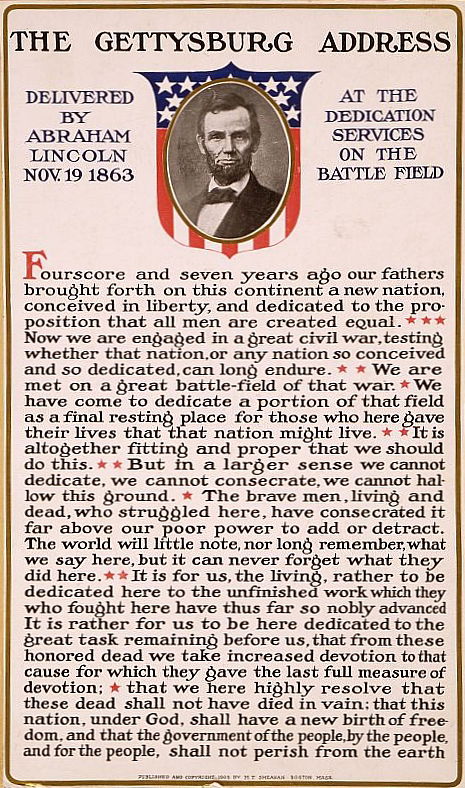Areth Gettysburg
Abraham Lincoln, 19 Du 1863
Kernowek © 2017 Ian Jackson

Scrysel a'n ugansves cansvledhen avarr
I’n Stâtys Udnys yma scoloryon ow tesky, dre gov, an darn-ma arethek ha meur y hanow. Practys dâ inwedh dhe dhescoryon a Gernowek. Gwrewgh argraf spladn in agas class!
Seyth bledhen ha peswar ugans alebma, y whrug agan tasow denethy wàr an brâstir-ma nacyon nowyth, concêvys i’n Lyberta, ha sacrys dhe’n tybyans pùb den oll dhe vos formys kehaval.
I’n eur-ma, yth eson ny omgelmys in gwerryans bredereth, gwerryans brâs, ow prevy mar kyll an nacyon-na, bò py nacyon pynag concêvys indelha ha sacrys indelha, durya termyn hir. Omvetys yth eson ny wàr gaslan vrâs i’n vresel-na. Devedhys on ny rag sacra radn a’n gwel batel-na in powesva dhewetha dhe’n re a ros obma aga bêwnans, bêwa may halla an nacyon-na. Yn very ewn y tegoth dhyn ny gwil hebma.
Saw, in styr moy efan, ny yllyn ny sacra – ny yllyn ny sona – ny yllyn ny consecrâtya – an tireth-ma. An dus colodnek, bew ha marow, myns a strîvyas obma, an re-ma re’n consecrâtyas, dres ha a-ugh agan gallos gwadn addya bò lehe. Scant ny vëdh an bÿs ow merkya, nag ow perthy pell in cov, an pëth a leveryn ny obma, saw nefra ny yll ev ankevy an pëth obma a wrussons ynsy. Y coodh dhyn ny kyns, an dus a vew, dhyn ny y coodh bos sacrys obma dhe’n whel avauncys ahës, heb colenwel kyn fe, gans seul a wrug batalyas obma maga fryntyn. Y coodh dhyn ny kyns, dhyn ny y coodh bos obma sacrys dhe’n ober brâs usy ow cortos genen – rag may whrellen ny kemeres, dhyworth an dus varow onorys-ma, devôcyon moghhës dhe’n ken may rosons y an dewetha musur leun a dhevôcyon dhodho – rag may fednyn ny obma ervira, uhel agan brës, na veu an re-ma marow yn euver – rag may caffa an nacyon-ma, in dadn Dhuw, genesygeth nowyth a franchys – ha rag nag ella governans a’n bobel, gans an bobel, dhe les an bobel, nag ella hebma dhe goll dhywar an bÿs.
The English original for reference:
Four score and seven years ago our fathers brought forth on this continent a new nation, conceived in Liberty, and dedicated to the proposition that all men are created equal.
Now we are engaged in a great civil war, testing whether that nation or any nation so conceived and so dedicated, can long endure. We are met on a great battle-field of that war. We have come to dedicate a portion of that field, as a final resting place for those who here gave their lives that that nation might live. It is altogether fitting and proper that we should do this.
But, in a larger sense, we can not dedicate – we can not consecrate – we can not hallow – this ground. The brave men, living and dead, who struggled here, have consecrated it, far above our poor power to add or detract. The world will little note, nor long remember what we say here, but it can never forget what they did here. It is for us the living, rather, to be dedicated here to the unfinished work which they who fought here have thus far so nobly advanced. It is rather for us to be here dedicated to the great task remaining before us – that from these honored dead we take increased devotion to that cause for which they gave the last full measure of devotion – that we here highly resolve that these dead shall not have died in vain – that this nation, under God, shall have a new birth of freedom – and that government of the people, by the people, for the people, shall not perish from the earth.